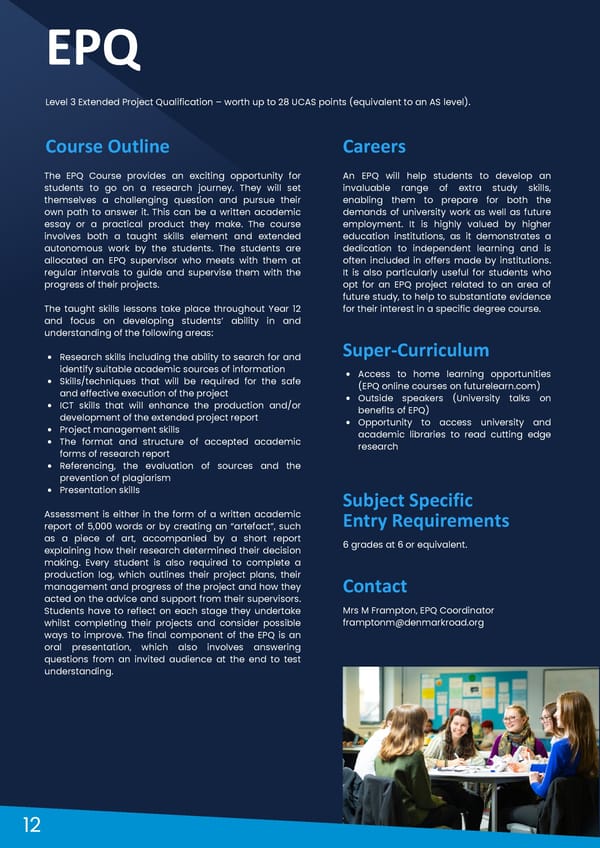ENGINEERING (WITH EPQ) EPQ Level 3 Extended Project Qualification – worth up to 28 UCAS points (equivalent to an AS level). New for September 2024 At Denmark Road we are delighted to be able to introduce for the first time an engineering option for interested students to study in Y12! This will give students the opportunity to learn engineering principles in taught lessons, Course Outline Careers as well as applying their knowledge to practical projects throughout the year (see Vibrant Experiences). The EPQ Course provides an exciting opportunity for An EPQ will help students to develop an This is not a formal qualification, but will allow students to build up an “engineering portfolio” to showcase students to go on a research journey. They will set invaluable range of extra study skills, themselves when applying for engineering courses or apprenticeships (including degree apprenticeships). themselves a challenging question and pursue their enabling them to prepare for both the own path to answer it. This can be a written academic demands of university work as well as future It will also allow students to complete a practical based Extended Project Qualification (EPQ), as well as essay or a practical product they make. The course employment. It is highly valued by higher potentially gaining Industrial Gold Cadets accreditation. involves both a taught skills element and extended education institutions, as it demonstrates a autonomous work by the students. The students are dedication to independent learning and is It will take up five lessons per fortnight, so should be taken alongside three other A-Level subjects (it will not be allocated an EPQ supervisor who meets with them at often included in offers made by institutions. feasible for students wishing to take four other traditional A-Levels due to time constraints). regular intervals to guide and supervise them with the It is also particularly useful for students who progress of their projects. opt for an EPQ project related to an area of future study, to help to substantiate evidence Course Outline Careers The taught skills lessons take place throughout Year 12 for their interest in a specific degree course. and focus on developing students’ ability in and Engineering is a fantastic blend of theoretical knowledge This is an excellent option for students understanding of the following areas: and practical skills. It takes concepts learned in subjects who are considering a career in such as Physics, Computing and Mathematics and applies engineering of any description – whether Super-Curriculum Research skills including the ability to search for and them to physical projects that will also develop design and that is through a higher education course identify suitable academic sources of information Access to home learning opportunities problem-solving skills. In addition to the theory and skills at University, or through an Skills/techniques that will be required for the safe (EPQ online courses on futurelearn.com) taught in lessons, the projects that students will be involved apprenticeship or degree apprenticeship. and effective execution of the project Outside speakers (University talks on in include: ICT skills that will enhance the production and/or benefits of EPQ) development of the extended project report Opportunity to access university and Greenpower challenge: students build and race an electric Subject Specific Entry Project management skills academic libraries to read cutting edge powered kit car! As part of this project, students will identify The format and structure of accepted academic research some area in which the standard design can be improved, Requirements forms of research report and complete a project based around this, and Referencing, the evaluation of sources and the implementing it into the car to improve performance, 6 or equivalent in GCSE Physics or 6-6 in prevention of plagiarism before trying it out at race days. Combined Science or minimum Grade 6 Presentation skills in GCSE Computing. Subject Specific EDT Engineering Project*: students are partnered with a Assessment is either in the form of a written academic local engineering company to come up with an engineering Entry Requirements If you are not taking A-Level/AS/Core report of 5,000 words or by creating an “artefact”, such solution to a real-world problem set by our mentors. For the Mathematics you must also have as a piece of art, accompanied by a short report 6 grades at 6 or equivalent. past three years we have been partnered with Mira achieved a minimum of a 6 in GCSE explaining how their research determined their decision Showers, and worked on projects relating to shower use, Mathematics. making. Every student is also required to complete a encouraging greater use of reusable menstrual cups, and production log, which outlines their project plans, their reducing water wasted in the home. management and progress of the project and how they Contact acted on the advice and support from their supervisors. Contact *In order to be formally entered into the EDT project and Mrs M Frampton, EPQ Coordinator Students have to reflect on each stage they undertake gain Industrial Gold Cadets accreditation there is a cost of Mr J Schofield, [email protected] whilst completing their projects and consider possible around £70-£80 per student – this includes all associated [email protected] ways to improve. The final component of the EPQ is an costs for the whole year, including visits and links with our Mr M Waller, [email protected] oral presentation, which also involves answering mentors, as well as a two-day University workshop and questions from an invited audience at the end to test residential to work on their project. understanding. https://www.etrust.org.uk/ic-gold-readmore Everyday Engineering: this is a national competition introduced by the Royal Academy of Engineering to “find the UK’s kitchen table engineers – people with ideas and innovations that could make or are making our daily lives more sustainable.” https://raeng.org.uk/ned-competition 12 13
 Subject Guide (Sixth Form) Page 13 Page 15
Subject Guide (Sixth Form) Page 13 Page 15